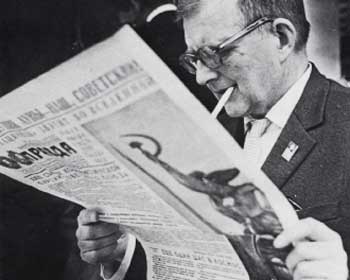
April 2000

|
||
|
SHOSTAKOVICH
- The "Holy Fool" & Shostakovich's Early Career
- "Chaos Instead of Music"
- Rehabilitation and Denunciation
THE EMERSON STRING QUARTET'S SHOSTAKOVICH CYCLE
|
(RealAudio 3.0; how to listen) |
|
Read Paul Epstein's Notes Recordings are available from 
|
IN LOOKING AT AN ARTIST'S LIFE, it can be difficult to separate those characteristics and tendencies that are essentially unique to the person - his or her innate temperamental elements - from those determined by nationality and the social and political context in which he or she lived. It's particularly interesting to take this sort of lens to the life of Dmitri Shostakovich, one of our greatest 20th-century composers, whose life was so intimately affected by the profound cultural upheavals in Russia during his lifetime. There are some interesting scholarly arguments simmering these days about Shostakovich and his relationship to the Soviet regime: Was he a "dissident hero" or a willing Communist? Yet it is sometimes forgotten that the characteristics that have been interpreted as indications of dissidence - the sadness and despair - also characterize a long tradition in Russian art, as well as the composer's own innate emotional world.
NEXT - The Holy Fool








